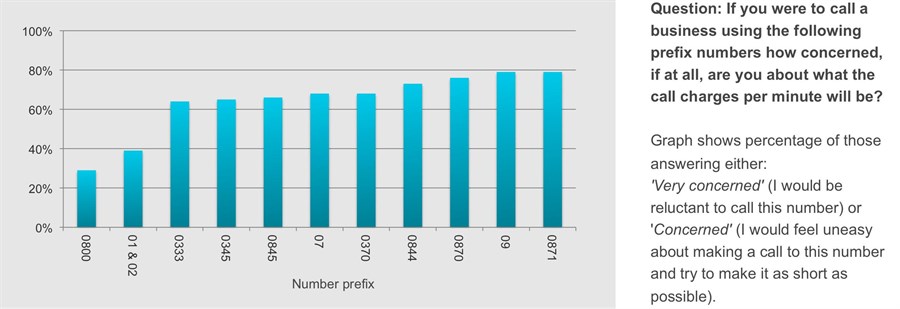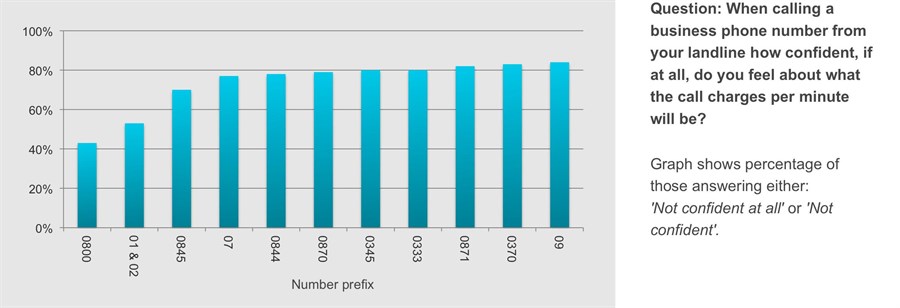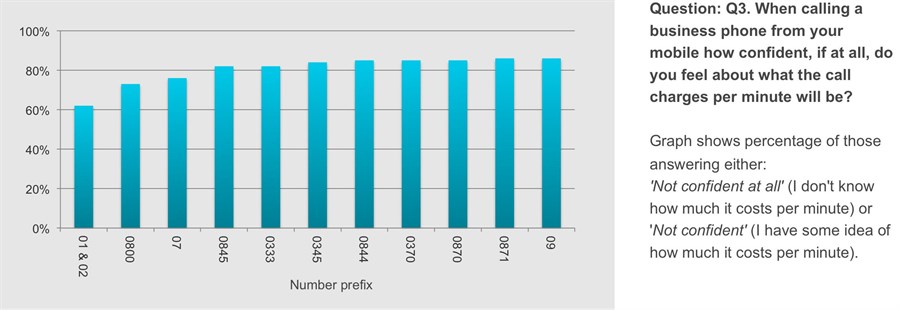Why your 03 numbers are failing (and what we can do about it)
Back in March we wrote about why some 08 numbers will be against the law for many businesses from the 13th of June this year. In that article we also covered what the pros and cons of the alternatives are. And, we promised to publish the results of some research that the respected pollsters ICM ran for us on what consumers actually felt about the old and new numbers.
Well, here it is. It’s not only told us more about what numbers you should consider. It’s also showing something that the whole of the UK service sector needs to take note of, if theses changes really are going to help build customer confidence. If not, that confidence may well be damaged rather than repaired. This article contains just a summary of the research. If you’d like a more in-depth look at the figures, and further comment from us, just get in touch for our in-depth research and analysis.
Consumers are as concerned about calling the new 03 numbers as some of the old 08 numbers

Figure 1: Consumer concern at calling different prefix numbers. It seems that 0333 was the best performing of the new numbers. But, with 64% of callers stating they’d be ‘very concerned’ or ‘concerned’ about calling it, that’s a real cause for alarm. Just 39% showed the same concerns when dialling the 01 / 02 prefixes, which is interesting given that call charges for the two are the same. With a concerted effort what it should be possible to do is to bring down the level of concern at calling 03 to that which matches 01/02 at least.The other big surprise was that consumers showed about the same level of concern when calling an 0845 number (66%) as they did with either 0345 (65%) or 0370 (68%). Calling an 03 number may be to the consumers benefit (as calls have to be included in most packages). But, at the moment at least, they just don’t seem to know it.Those businesses that have moved over to using 0800 numbers can feel reassured that they’re using the best of the bunch. Only 29% of consumers feel concerned about calling it. Having been known as the ‘Freephone’ number for such a long time perhaps that isn’t a surprise.At the moment callers using 0800 numbers may still be charged for their call if they’re using a mobile network. This may be what’s stopping it from reassuring more customers. However Ofcom will make 0800 free to call for all customers, from June next year, no matter what network (mobile or landline) they’re on. When this happens we may see the level of concern drop further.
Consumers have less confidence in their knowledge of call charges for 03 numbers than most 08 numbers

Figure 2: Lack of confidence in knowledge of landline call charges to various number prefixes.’One of the things that we thought might be driving this high level of concern (other than the level of call charges) was how confident consumers were in how much they’d be charged. You can see the results in figures 2 and 3. These cover what customers thought of their own knowledge of call charges when calling from landlines and mobiles respectively.

Figure 3: Lack of confidence in knowledge of mobile call charges to various number prefixes.Comparing all the prefixes in both graphs consumers had less confidence in their knowledge of what they’d be charged when calling from a mobile than a landline (there’s a 7% difference in the means of all prefixes).You can also see that 0800 was on top for landlines. But, drops to second, behind 01/02, for mobiles. As I mentioned earlier, 0800 is charged for by some mobile providers. This is probably creating the consumer confusion that lies behind this switch in positions.
What you should do about it
For the moment, wherever you publish your new 03 numbers – on websites, letters, emails, brochures and even phone systems themselves – let consumers know how much it’ll cost them and that the number change is to their advantage. Unfortunately what callers will actually pay is variable as it’s dependent on where they’re calling from and whether they have any ‘bundled minutes’. So, communicating this in a concise, easy to understand and accurate way is very difficult. If you need some help on where and how to communicate the changes in the best way take a look at our number change communication review below.Also, it won’t suit everyone, but think about publishing your geographic numbers (01/02) alongside your 03s. They’re useful for overseas callers and consumers seem happy to call them and are confident in how much they’ll be charged.Finally, consider using 0800 numbers if you really want to reassure your customers. It’s the number that had the lowest concern associated with it. And, when Ofcom’s changes come about next June, confidence is likely to grow further.
We’re going to need to work together on this one
The good news (if you can call it that) is that using 03 numbers is going to be no more damaging than using your old 08 numbers. The bad news is that it was Ofcom’s intention to create greater consumer confidence in the numbers they’re asked to call, that just hasn’t happened yet. In short, customers simply don’t yet know what 03 means to them in terms of cost.The cost of asking almost every business in the UK to change their numbers is likely to run into hundreds of millions pounds. But, if these changes are to start to build consumer trust immediately and be worth this considerable cost, the UK service sector is going to have to work together to make sure that consumers know that something good has happened for them.Ofcom will also be promoting 03 numbers as part of a consumer information campaign around non-geographic numbers next year.
Number change communication review
To help you to make sure that the numbers you use for sales and service are not barriers to your customers we can carry out a review for you. We’ll look at where you’ve communicated the changes so far and make sure that you’ve covered all of the bases. Also, we’ll see whether what you’re saying is short, accurate and easy to understand (as well as suggest any changes if necessary). If you’d like us to carry out a review, or just want to know more about what it entails, get in touch.


